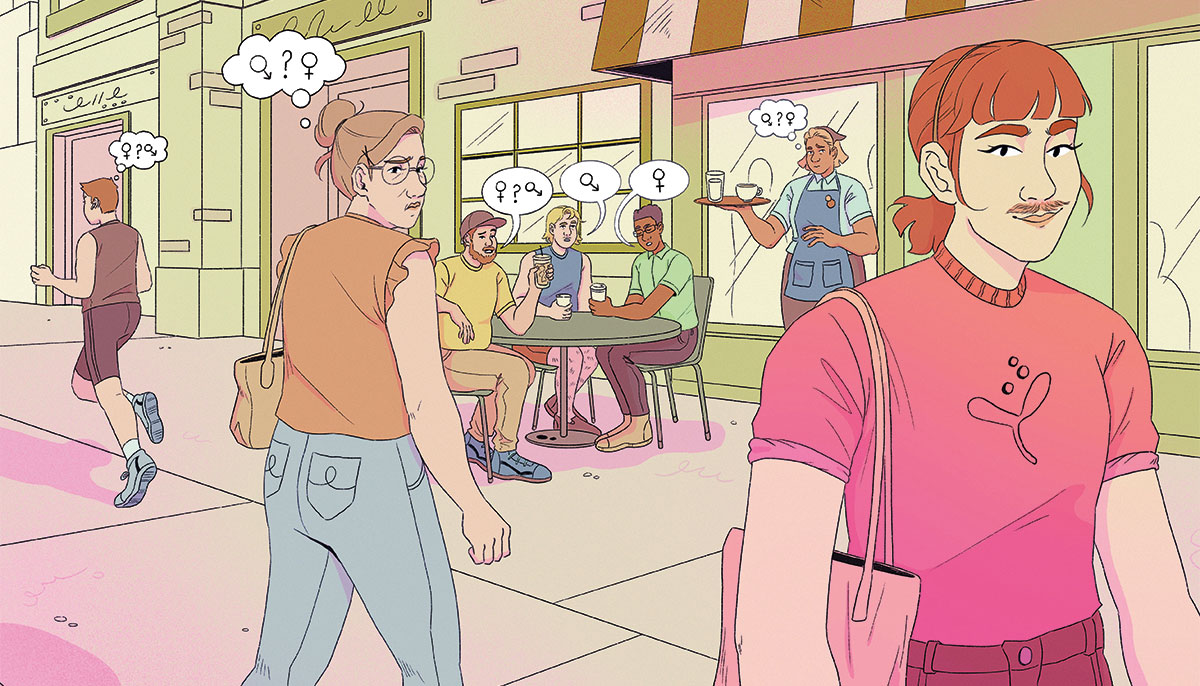I’m strolling down a avenue close to my home. It’s a heat afternoon. A delicate wind performs with the bushes. There are some males standing outdoors a store, consuming. I stroll previous them and overhear: “Is {that a} man or a girl?” I keep it up strolling.
That is an on a regular basis expertise for me, one I share with many nonbinary individuals. The query follows us, surfacing from individuals’s lips—indicating that we confuse and upset them as a result of we problem their preconceptions; we don’t match into the binary classes they use to guage people. Caught on this confusion, they double down, demanding we match into this or that field.
These males aren’t particular or distinctive. The ignorance they reveal is common to completely all of us. Each day of our lives, issues seem to us, and we ask: Is that this factor good or unhealthy? We love what we expect is sweet and chase it all over the place; we hate what we resolve is unhealthy and take a look at desperately to flee it. We’re caught in dualisms. That is the very human dilemma that Zen responds to.
Nonbinary individuals commonly face the prejudices of a world clinging to dualities. This implies discovering the braveness to reside with these prejudices. Equally, bodhisattvas don’t disappear into nirvana. They keep on this world and vow to work for the liberation of these sharing it with them.
To enter the Buddha method, the bodhisattva should let go of dualistic pondering. Because the sixth-century Zen grasp Kanchi Sosan mentioned in his poem “Shinjinmei,” “Coming into the best way shouldn’t be troublesome, however you need to not love, or hate, or select, or reject.”
The best way may not be troublesome, nevertheless it’s not simple both. Love and hate come naturally. I hate being handled like an alien due to who I’m; I really like being handled with kindness and understanding. As I make my method across the metropolis, it’s simple to be cautious of the individuals I cross. Will they harass me? Ought to I be cautious of them? That is my method of maintaining secure, nevertheless it’s not the Buddha method.
In his commentary of “Shinjinmei,” American Zen instructor Philippe Rei Ryu Coupey explains that when Kanchi Sosan suggested us to let go of affection, he was referring to a “slender love, primarily based on you and me” and the non-public variations between us. That is the love that makes us put our family and friends first, above the remainder of the world.
The love of the Buddha method is broader than this. It’s, says Coupey, an all-encompassing “compassion that takes place when there is no such thing as a distinction between man and lady.” Coming into the best way shouldn’t be troublesome, if we will loosen the maintain that on a regular basis prejudices have on us.
In feminist circles, it’s typically mentioned that the gender binary is a social assemble. Within the language of Zen, we would say it’s ku. This doesn’t imply it doesn’t exist. Cash can be a social assemble, however attempt telling that to your landlord subsequent time hire is due! When the boys outdoors the store attempt to decipher my gender, they’re asking a really actual query.
Reminding ourselves of the arbitrary nature of this query calls us to detach ourselves from it. It might assist us acknowledge that different realities are potential outdoors the binary solutions given. It’d even give us the liberty to manifest this chance.
Shinjinmei is usually translated as “Religion in Thoughts.” This isn’t the small thoughts of our on a regular basis private prejudices, however Buddha thoughts. Buddha thoughts is the unique thoughts that permeates the whole lot, earlier than ideas and private opinions come up. This state of equanimity doesn’t separate particular person issues based on specific judgments. After we nurture this thoughts in ourselves, we contact the basis connecting us all to one another and the whole lot else. Bodhisattvas vow to hold this state with them of their every day lives.
We’re used to pondering of religion as an outward-facing factor, directed at a God separate from us. However “in Zen, religion has no object,” writes Coupey, “it’s religion in oneness, past God, past Buddha,” and past all separations of the mundane world. I got here to Zen by apply, earlier than scripture, earlier than idea, by sitting zazen with others and experiencing truths that defy dualistic explanations. I come to my nonbinary gender in the identical method.
It’s a heat afternoon, and I’m making ready to depart my home. I open my closet to decide on an outfit. There are garments in there that are “proper” for me to put on, and garments which might be “mistaken.” Harassment and assault are widespread punishments for these carrying the “mistaken” garments.
In his commentary, Coupey says religion is “the instinct that fact is current on this very second.” As we speak, I’ve no cause to decorate “the suitable method.” On days like this, worry can’t get a purchase order, falling from me like water from a duck’s again. I let my arms information me and placed on some garments. I notice fact is current in each second I enable myself to reside past binary expectations.
Residing nonbinary doesn’t imply escaping the gender binary. Fairly the alternative. Nonbinary individuals commonly face the prejudices of a world clinging to dualities. This implies discovering the braveness to reside with these prejudices. Equally, bodhisattvas don’t disappear into nirvana. They keep on this world and vow to work for the liberation of these sharing it with them. Such a vow is grounded within the realization that every one are able to liberation. In the identical method, residing nonbinary articulates the religion that freedom from dualities is a chance for all of us.
I’ve written this text within the full information that the truths of Zen Buddhism are past language. Making an attempt to pin them down with phrases is to look at them slip away. However I don’t have the luxurious of silence: the struggle for nonbinary rights requires language. Language that describes, compares, and speculates. Like all language, we should always deal with it with an open hand. Nestled delicately inside is the unfinished seed of a revolutionary thought: actuality is basically extra complicated than the dualistic containers we make for it.
“The best way is spherical, at peace and excellent, huge because the huge cosmos, with out the slightest notion of relaxation or rupture,” wrote Kanchi Sosan in “Shinjinmei.”
Which is the suitable aspect of a circle? Which is the left aspect? This query solely is smart from the angle of somebody who stands outdoors, somebody who separates himself from what he desires to grasp. After we sit zazen, the distinctions between female and male disappear. They lose their relevance. When there is no such thing as a distinction, no duality, there’s merely the vastness of the whole lot there’s, with out relaxation or rupture.
I’m strolling down a avenue close to my home. It’s a heat afternoon and I’m carrying an outfit that I’ve been advised is “mistaken.” There are some males standing outdoors a store once more, consuming. I stroll previous them, and as soon as they’re behind me, I overhear them speaking. They’re attempting to work out the suitable aspect of a circle.



